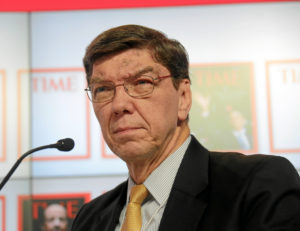
Clayton Christensen, was a Professor of Business Administration, Harvard Graduate School of Business Administration.
Clayton Christensen died on January 23 and it’s a big deal and a really big loss for all of us who love business and entrepreneurship.
He was only 67 years old when he died of complications after a long battle with leukemia.
Back in 1997, Christensen wrote a classic book called “The Innovator’s Dilemma.” It has been called the most influential business book of the last 30 years.
Since the book came out, I’ve lost count of how many times I have been in an entrepreneur’s office and seen “The Innovators Dilemma” on a shelf.
I smile when I see the book because it tells me a lot about the entrepreneur I am meeting. It shows me that he or she is not overconfident. It tells me they are wrestling with the great questions that creating anything of value requires us to answer.
Last week, Christensen’s last interview was published in the MIT Sloan Management Review and it’s a good one. Here’s the link: https://sloanreview.mit.edu/article/an-interview-with-clayton-m-christensen/?utm_source=El1&utm_medium=pr&utm_campaign=Chris0220
The theory of the Innovators Dilemma addresses the issue of disruption. The dynamics that allowed Netflix to obliterate Blockbuster Video or the iPhone to render the Blackberry obsolete. In his last interview, Christensen says companies still haven’t solved the Innovator’s Dilemma 23 years after his book made us aware and gave us some tools to address the issue.
“Companies certainly know more about disruption than they did in 1995, but I still speak and write to executives who haven’t grasped the implications of the theory. The forces that combine to cause disruption are like gravity…they are constant and always at work within and around them. It takes very skilled and very astute leaders to be navigating disruption on a daily basis.
In my experience, it seems that it’s often easier for executives to spot disruptions occurring in someone else’s industry rather than their own, where their deep and nuanced knowledge can sometimes distract them from seeing the writing on the wall.”
Indeed.
I’ve referenced Christensen’s work in the businesses I’ve been involved in and I also put his theory to the test in reference to cities. The best way to avoid being disrupted and put out of business is to foster a culture of innovation. Christensen talks about innovation in relation to prosperity and growth in America in his last interview.
“In…The Prosperity Paradox, we describe three types of innovation…’sustaining innovations,’ which… is the process of making good products better…’efficiency innovation,’ which is when a company tries to do more with less…and ‘market-creating innovations,’ meaning they build a new market for new customers.’ [The last category] are the source of growth in any economy… My sense is that we in the United States, like many other developed countries, are investing far too much energy in efficiency and sustaining innovations, and not enough in market-creating innovations.”
Interesting especially if you run this through the lens of fostering a great city.
Yes, we can take what’s already working and make it better and we can strive to do more with less but the key is to open up new markets. The secret to lasting success is to be open to new ideas, to resist complacency and to try some stuff.
Better an ‘oops’, than an ‘if’.
On the municipal level, most mistakes aren’t fatal. You will never bat 1.000 but you may learn some things that help you figure it out down the road.
In cities, you always try to make what works even better—so Boca keep your pristine parks and Delray don’t mess too much with Atlantic Avenue or the beach—you can always be more efficient but in order to stay on top you need to keep innovating.
Boca can re-invent Federal Highway and Delray can and should transform and improve Congress Avenue and The Set. Create new markets, Professor Christensen advised us, and you won’t be disrupted by that city next door who will steal your jobs, commerce, residents and talent if you are smug, complacent or dysfunctional.
We’ll miss the good professor. When asked how he wanted to be remembered. Here’s what he said:
“I want to be remembered for my faith in God and my belief that he wants all of mankind to be successful. The only way to make this happen is to help individual people become better people, and innovation is the key to unlocking evermore opportunities to do that.”
Amen.
Speak Your Mind